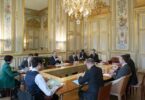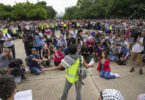Sidita Kushi
After decades of consistent bipartisan support, United States foreign policy has soured against Kosovo in a bid to lure Serbia’s authoritarian government away from Russia’s orbit. The European Union, meanwhile, has imposed crippling sanctions on the vulnerable country. This is surprising because Kosovo’s very existence is the result of Western support and it currently ranks as the region’s top performer in democratic progress and aspirations.
A NATO-led intervention in 1999 rescued the majority ethnic Albanian territory from Serbian ethnic cleansing campaigns, which murdered 10,000 people and displaced more than 1 million. Ever since, Kosovo has been a grateful ally, doing everything the US asks. Kosovo has taken in hundreds of Afghan refugees at Washington’s request; it has controversially opened an embassy in Jerusalem as demanded by the US; and it is home to Bondsteel, a large US military base. Kosovo also has condemned Russia’s invasion of Ukraine, sanctioned Moscow alongside the US and accepted Ukrainian refugees. Despite all this, the US and EU are pressuring Kosovo to halt its path towards greater sovereignty and institutional capacity as a condition for Western support.
After decades of near-perfect obedience to its Western partners, Kosovo remains in a fragile limbo. It has no way of solidifying its sovereignty because several EU and NATO states still refuse to recognise it, and Serbian President Alexander Vucic insists that his country will never recognise Kosovo, no matter what. Recent Kosovo-Serbia tensions culminated in Serbia “arresting” three Kosovo police officers without a clear cause, an act that Kosovo called a “kidnapping” and “foreign aggression” within Kosovo’s borders. The US demanded that Serbia immediately and unconditionally release the officers. Yet at the same time, the US, EU and NATO carried on with “both sides” appeals to de-escalate, and they punished Kosovo with diplomatic ire and sanctions. Ultimately, it was Hungarian Prime Minister Viktor Orban who received public credit for persuading Serbia to release the Kosovar policemen, not the US or EU.
It’s clear that the US and its European partners look at Vucic’s regime through foggy, rose-coloured glasses. Despite Serbian-sponsored violence that recently injured 30 NATO peacekeepers and more journalists, US Ambassador Christopher Hill praised Vucic as a “good partner”, and Senator Chris Murphy went as far as to call Vucic “a friend”. As the US scolds and the EU sanctions Kosovo, their “good partner” synchronises its policies with Russia and grows more autocratic and closer to its irredentist goals. Vucic also refuses to sign on to pivotal Western agreements, let alone implement the demands. Yet while Russia and China came out in support of Serbia in the face of the recent escalation, Western allies rebuked Kosovo for upholding its rule of law. Even when Western diplomacy isn’t actively against Kosovo, it’s laden with “both side-isms” that embolden Belgrade to maintain de facto rule over the chaotic north.
If they’re not careful, Western diplomats will repeat the same placating policies that emboldened Serbia’s “Butcher of the Balkans”, Slobodan Milosevic, more than 20 years ago. The Western powers need to reverse course urgently if they’re serious about ensuring Kosovo’s sovereignty and protecting NATO’s legacy in the Balkans. If the US abandons its historical commitments to Kosovo, it will debilitate the most successful Western state-building and democratisation project in the post-Cold War era. It will also open the floodgates to more violent crises and anti-Western influences over a strategic region in Europe. This isn’t the first time that Serbia has escalated tensions in northern Kosovo and then de-escalated to Western praise. In the past two years alone, Serbia has stationed troops on the border with Kosovo multiple times. Each time Serbia “escalates to de-escalate”, US and EU diplomats rush to condemn Kosovo, but never Serbia. In December, Serbia sent tanks to the Kosovo border to squelch a reciprocal policy on license plates. Kosovo had insisted that Serb citizens swap their Serbian-issued plates with Kosovo-issued ones to gently promote Kosovo sovereignty in the north. Then the US and EU told Kosovo to stand down after Belgrade sponsored unrest among the Serb minority, which culminated in the resignation of all Serb public officials in the north. Kosovo’s leader agreed to Western demands and postponed the enforcement of reciprocal policies. The Serbs conceded nothing, and the northern municipalities remained vacant. More recently, Belgrade-sponsored mobs armed with guns and explosives attacked NATO troops, journalists and bystanders in northern Kosovo.
This time, the spark was the Kosovo government’s insistence on guiding four newly elected municipal mayors into their offices. Under orders from Belgrade, the Serbs in the north had boycotted April elections despite Western assurances that the Serbs would participate. In fact, Belgrade pressured the last of the Serb political candidates to drop out of their races days before the municipal elections. This resulted in ethnic Albanian and Bosniaks being elected to fill the vacant spots. The US and other Western countries approved the results of the elections. But when it was time for the new mayors to start their jobs, the Serbs in the north blocked them from entering their offices. Facing the Serb protests and barricades, the Kosovo police needed to escort the elected politicians into the municipal buildings, which ignited clashes between ethnic Serbs and Kosovo police. In response, Serbia placed its military on high alert on the border once again. The election results and the plan to escort the mayors into the buildings did not come as a surprise to the US or the EU. Kosovo Prime Minister Albin Kurti had announced the swearing-in of the majors days in advance. Despite this, US Secretary of State Antony Blinken blamed Kosovo for enforcing the results of the US-supported elections. The Quint, NATO, and the EU all followed suit in lambasting Kosovo for enforcing its institutional integrity.
Blinken did not blame Serbia for placing its military on full combat alert and positioning troops on the border. US and EU diplomats said little after the first round of rioters set fire to police cars and attacked journalists. Without chastisement from the US, it is no surprise that the rioters pushed the limits of Western appeasement and continued on the next day to injure 30 NATO troops, destroy media vehicles and mark multiple KFOR and EULEX cars with Z symbols. Instead of condemning the Serb-instigated attacks, the US annulled Kosovo’s involvement in NATO exercises and stopped its active support of Kosovo’s global recognition campaign. As the EU imposes clear sanctions, many wonder whether the West still seeks an independent, democratic Kosovo. The pattern of US and EU appeasement in the Balkans is obvious, and it corrodes regional credibility in Western diplomatic capacity and principles. US diplomacy appears to favour stronger authoritarian regimes like Serbia’s while condemning weaker actors like Kosovo. Kosovo was the only country in the region this year that saw democratic improvements. Yet for the sake of stability and to bring Serbia under Western influence, the US has promoted many of Serbia’s regional priorities as its own, such as the Association of Serb Majority Municipalities within Kosovo, which would allow the Serb minority to hold executive powers akin to a separate sovereign power in the north, without any promise of formal recognition of Kosovo’s statehood in exchange. Against the backdrop of Serbia’s biggest anti-government rallies in decades, Vucic provokes violence in Kosovo to distract from domestic resentments. And with each military provocation, Vucic pushes the boundaries of what is acceptable to the West. Even after days of Serbian-led violence, the West demands immediate concessions from Kosovo while gently asking Vucic to “urge calm among Kosovan Serbs”. While Kosovo’s government has agreed to hold new elections and offered clear steps to de-escalate, its Western partners demand even more. But Kosovo is unwilling to abandon the north to a de facto rule by parallel institutions while Vucic’s regime provokes with impunity. Kosovo’s aspirations are the same as those proclaimed by much of the West: to promote Kosovo’s statehood, build a multicultural and multiethnic society with robust minority rights, and grow closer to NATO and EU structures. Yet current Western diplomacy promotes Vucic’s goals even though Vucic’s regime has defied the US over and over, such as when Trump’s envoy to Kosovo and Serbia Richard Grenell demanded that Serbia end its de-recognition campaign against Kosovo. Serbian Foreign Minister Ivica Da?i? outright refused. The Serbian regime still buys sanctioned weapons from Russia, sponsors criminal and destabilising elements in northern Kosovo, promotes Milosevic’s legacy and refuses to sign on to major Western-led normalisation agreements. All without an ounce of Western sanctions.
These policy shifts are bringing us back to the Western legacy of “stabilitocracies” of the early 1990s, which ended in genocide, mass crimes against humanity and several NATO interventions in the Balkans. Vucic’s aggressive stance against Kosovo allows his unpopular regime to consolidate power by reactivating ethno-nationalist myths and mobilising along ethnic lines – a strategy that mirrors that of his predecessor Milosevic. Instead of preventing the rise of another Milosevic, US diplomacy has invigorated Serbia to escalate tensions for reward. Instead of supporting Kosovo’s democratic progress and pro-Western fervour, the US implicitly supports Serbia’s de-recognition campaigns and dangerous ethno-nationalist mobilisations, which may trigger a crisis across Bosnia as well. In response to the Serbian-sponsored attacks against NATO, the best that Blinken could do was to utter vague “both sides” rhetoric, repeating the same narrative that led us here. My research shows the detriment of deploying a “both sides” equalisation narrative during security crises. Even after Serb attacks against NATO troops, representatives of the US and EU did not name the aggressor and instead called on “both sides” to de-escalate. This strategy culminates in the appeasement of the stronger aggressor state and the punishment of the victims of aggression.
The ethnic Serbs living in northern Kosovo also suffer at the hands of the Serbian government because they serve as faceless political pawns. Under the accusation of “treason”, Serbia has sometimes arrested Serbs from the north when they collaborated with Kosovo institutions. Most recently, another local Serb politician withdrew from politics in the north due to threats to his life and family. Belgrade’s policy, therefore, punishes the integration of ethnic Serbs under legal Kosovo institutions and rejects a multicultural framework. Without swift change, the Western alliance will wade into a damaging dependency that relies on illiberal leaders to maintain stability. This path allows leaders like Vucic to comfortably grow in their authoritarian tendencies and even praise Milosevic’s intentions to impose Serbian domination. This path stomps on democratic principles and turns its back on Western allies in favour of wooing Russia’s friends. Currently, both the US and EU are carving a path for an emboldened autocratic Serbia that uses the same playbook as Milosevic to maintain power. On that road, the West is abandoning Kosovo’s democratic and liberal aspirations, leaving its decades-long investments to wither. Western diplomacy should shift gears before it’s too late and the path is set in stone. US and EU diplomats must lead with carrots for allied Kosovo to promote cooperation with an unapologetic Serbia, which refuses to take accountability for the crimes of its past and is even ripe to repeat them. The US especially should also dish out some degree of diplomatic chastisement or sanctions for Serbia’s patterns of escalations and refusal to negotiate in good faith with Kosovo the state, not Kosovo the former province. If the West is still serious about Kosovo’s sovereignty and the security of the region, it ought to act like it.
Aljazeera







